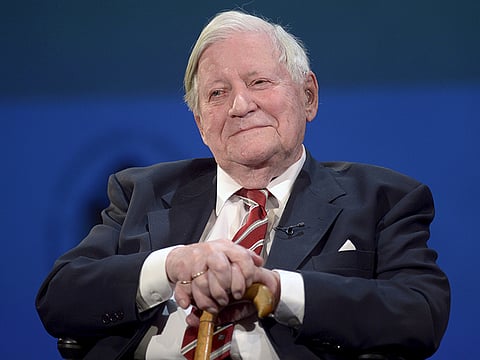Schmidt helped shape modern Germany in tumultuous decade
As chancellor, Schmidt extended West Germany’s influence in Nato and Europe as he balanced close ties with the US

Berlin: Former West German Chancellor Helmut Schmidt was one of the founding fathers of the euro but will probably be best remembered for his tough stance against the far-left Red Army Faction (RAF) guerrillas whose kidnapping and murder campaign terrorised the country over three decades.
Schmidt, who died on Tuesday aged 96, was West Germany’s second centre-left Social Democrat (SPD) chancellor from 1974 to 1982, at the height of the Cold War, after serving as finance minister from 1972 to 1974.
More popular as an elder statesman than he had been as chancellor, in later life he became a frequent guest on talk shows, opining on world affairs through a thick cloud of cigarette smoke.
This year he shocked Germans, however, by admitting that he had had an extramarital affair decades earlier.
As chancellor, Schmidt extended West Germany’s influence in Nato and Europe as he balanced close ties with the United States with some conciliatory gestures towards communist East Germany.
As finance minister, Schmidt steered West Germany through a series of global currency crises caused by a weakened dollar and the first oil price explosion. He became chancellor after Willy Brandt resigned when a close aide was unmasked as a Communist East German spy.
Under his stewardship, West Germany continued to enjoy the ‘Economic Miracle’ and reap the rewards of rebuilding an economy shattered by the Second World War but the situation deteriorated during his time in office and he tried to make modest welfare cuts.
Many will remember him best for his handling of the left-wing RAF urban guerrillas, also known as the Baader-Meinhof Gang, whose assault on the political and business establishment peaked in the “Deutsche Herbst” (German Autumn) of 1977 when the group kidnapped Employers’ Federation head Hanns-Martin Schleyer to demand the release from prison of several RAF members.
In a coordinated action, Palestinian militants seized a Lufthansa passenger jet flying to Frankfurt. Under Schmidt’s orders, German police commandos stormed the plane on the tarmac in Mogadishu, Somalia, and freed the hostages. Three of the imprisoned guerrillas, including RAF leaders Andreas Baader and Gudrun Ensslin, died that night in apparent suicides.
Schmidt’s refusal to give in to the group’s demands was greeted ecstatically at home and marked a turning point in the RAF campaign which continued but never with the same potency.
It cemented his reputation as a determined and tough-minded leader and boosted the country’s international standing.
In 1979, Bonn gained international recognition to match its economic power when Schmidt was invited to join a summit of the leaders of the United States, France and Britain.
His years in office also saw the first steps towards the birth of a single European currency with the creation of the European Monetary System (EMS) in 1979, an initiative from Schmidt and then French President Valery Giscard d’Estaing.
The EMS, which linked European currencies for the first time, was a precursor to the euro.
Schmidt was born in the northern port of Hamburg on December 23, 1918, the son of two teachers. He fought on both the eastern and western fronts in the Second World War, rising to the rank of lieutenant. He was briefly taken prisoner by the British.
In the early 1980s Israeli Prime Minister Menachem Begin attacked Schmidt’s war record, accusing him of never having broken his loyalty to Adolf Hitler. But his experiences as a front-line soldier left Schmidt convinced of the importance of European integration for peace and of a strong alliance with the United States to face the Cold War Threat from the Soviet Union.
He struggled with the delicate balancing act between “Ostpolitik”, launched by Brandt, which struck a conciliatory note towards Moscow, and trying to boost West Germany’s stature in the West.
He encouraged greater trade with the Soviet bloc and pleaded with Washington and Moscow to maintain a dialogue after the 1979 Soviet invasion of Afghanistan.
But he saw danger in Moscow’s deployment of new SS-20 medium range nuclear missiles and pressed Nato allies to agree on retaliatory measures. Ultimately he backed Nato’s 1979 decision to deploy Pershing-2 and Cruise missiles in Europe if Moscow refused to remove the SS-20s.
With anti-missile sentiment building at home, his own SPD eventually turned against the plan, however. By the time the first Pershings were deployed in December 1983, Schmidt had been deserted by his Free Democrat (FDP) coalition partners and was no longer chancellor.
At the time of his death, Schmidt was publisher of Germany’s largest weekly newspaper, Die Zeit, and retained some influence in the SPD. He actively backed the party’s Peer Steinbrueck to challenge Chancellor Angela Merkel in 2013.
Schmidt was married for 68 years to his childhood sweetheart, Loki, with whom he had a son who died in his first year and later a daughter, Susanne. Loki died in 2010.
He often publicly professed his love for his wife but revealed in a book in March 2015 that he had had a mistress many decades ago. In the late 1960s or early 1970s Loki had offered him a separation over it, but he had dismissed the idea as ‘absurd’.
He was an accomplished classical pianist and commercially recorded several works by Bach and Mozart with the conductor and pianist Christoph Eschenbach, including in 2008 a CD to mark his 90th birthday.



